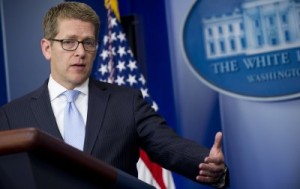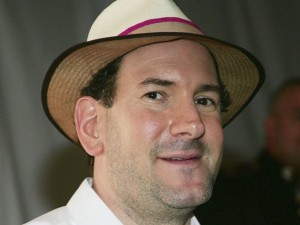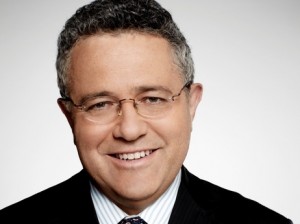 |
| Jay Carney on the Hot Seat (Photo: Saul Loeb, Getty Images) |
You gotta feel for Jay Carney. Not one, not two, but three concurrent crises for which he alone has been saddled to articulate the Administration’s positions. Well, not exactly alone, but compared to how previous administrations have handled such affronts — political or otherwise — Carney’s the man in the hot seat charged with addressing all three crises in a single presser.
From Bloomberg’s story in which some Democratic PR consiglieres reflect on the “laxity” of the Administration’s scandal response:
“‘There’s an industrial-scandal complex that exists in Washington, D.C.,’ said Chris Lehane, a Democratic consultant who worked as a special assistant counsel to Clinton. ‘You need to have some kind of entity within the building that’s capable of managing these situations.’
Clinton organized a group of lawyers, communications specialists and legislative affairs experts to manage his administration’s response to investigations into the president’s affair with Monica Lewinsky, the Whitewater real estate deal when he was Arkansas governor and firings in the White House travel office.
The West Wing is now in damage control without the first-term team of political advisers, who include former press secretary Robert Gibbs, political strategists David Axelrod and David Plouffe and former chief of staff turned mayor of Chicago Rahm Emanuel.”
To be honest, I have never been impressed by young Mr. Carney. I find his communications style to be halting, and his choice of words to often miss opportunities to hammer home the message. He just appears nervous standing up there, which is not an impression that inspires confidence. Here’s a direct quote from him in response to emails the GOP used to bolster its spurious Benghazi narrative:
“I think the entire email — the report I read showed the entire email, and what it showed is that Republicans who were leaking these press — these emails that have been shared with Congress didn’t just do that; they decided to fabricate portions of an email and make up portions of an email in order to fit a political narrative,” Carney said. “And I think — I’m not surprised by it because we’ve seen it again and again.”
 |
| Right Wingleader Matt Drudge |
Huh? Admittedly, the holder of this particular job in this political climate requires considerable fortitude to parry with a rabid White House press gaggle that increasingly derives its narrative from a calibrated right wing media machine. Brent Budowsky, writing for The Hill, talks about Obama’s need for his own Drudge to drive his narrative:
“Organizing for Action is fine, but what is needed, as well, is support for media structures similar to Drudge, state party-building outside of Washington and grassroots movements that transcend any one president at any given moment.
The unprecedented influence of Drudge is that he offers a scandal and message megaphone to conservative media, politicians and ideas that drive the national narrative that Drudge horizontally cross-promotes.
GOP attacks rocket from Issa’s keyboard to Fox News and Drudge’s site, which beams them outward to be repeated from “Morning Joe†to the evening news and daily newspapers. Armies of mainstream media insiders pore over the Drudge Report like Talmudic scholars, which arguably make Drudge the single most influential person in American media.”
I will admit that Mr. Carney has shown improvement since his earliest days at the podium. Mr. Obama, on the other hand, continues to ignore his base and react to crises based on what he has been advised will effectively quell the issue. He continually misses opportunities to change the GOP narrative and in so doing, advance his own, as was the case with the burgeoning IRS scandal. From MSNBC:
“A clearly frustrated Obama made clear at a press conference on Monday that he was angry with the IRS, calling the organization’s actions “outrageous.†“There’s no place for it. They have to be held fully accountable, because the IRS as an independent agency requires absolute integrity,†said Obama, who said he became aware of the alleged actions on Friday, just like everyone else. “If you’ve got the IRS operating in anything less than a neutral and bipartisan way, then it is outrageous.â€
Yes, true, but Mr. Obama somehow neglected to mention the explosion in 501 C-4 filings by political organizations in the run-up to the 2010 and 2012 elections. TPM’s Eric Lach drudges up a fresh Q&A with Lois Lerner, head of the IRS’ tax-exempt organizations division:
“Lerner began by describing the increase in 501(c)(4) applications the IRS received between 2010 and 2012. IRS employees in Cincinnati, Lerner said, had reacted by centralizing the applications for efficiency and consistency, something the IRS did ‘whenever we see an uptick in a new kind of application or something we haven’t seen before.’
But in this case, Lerner said, the centralization had not been carried out properly. ‘Instead of referring to the cases as advocacy cases, they actually used case names on this list,’ Lerner said, according to a transcript of the meeting. “They used names like Tea Party or Patriots and they selected cases simply because the applications had those names in the title. That was wrong, that was absolutely incorrect, insensitive, and inappropriate — that’s not how we go about selecting cases for further review.â€
 |
| The New Yorker’s Jeffrey Toobin (Photo: CNN) |
Once again, the GOP media machine has succeeded in obfuscating the bigger issue of how political groups have sidestepped IRS rules to gain tax-free and opaque status for pure political means under the false guise of “social advocacy.” The New Yorker‘s Jeffrey Toobin sums it up pretty neatly:
“It’s important to review why the Tea Party groups were petitioning the I.R.S. anyway. They were seeking approval to operate under section 501(c)(4) of the Internal Revenue Code. This would require them to be “social welfare,†not political, operations. There are significant advantages to being a 501(c)(4). These groups don’t pay taxes; they don’t have to disclose their donors—unlike traditional political organizations, such as political-action committees. In return for the tax advantage and the secrecy, the 501(c)(4) organizations must refrain from traditional partisan political activity, like endorsing candidates.”
Then of course, there are journalists working for mainstream news orgs who just can’t keep their wingnut opinions to themselves. Here are a few tweets from CNBC’s John Carney (no relation to Jay Carney), and one from Time.com’s Zeke Miller who’s no stranger to letting his political biases frame his reportage:
Jeffrey Toobin’s piece on the IRS scandal is utter BS. nyr.kr/17ZlwI6
— John Carney (@carney) May 14, 2013
Jeffrey Toobin treats politically biased tax enforcment as if it were an aside, the real scandal being the actual law. Blech.
— John Carney (@carney) May 14, 2013
Toobin also neglects to mention altogether that “social welfare” explicitly includes “political education.”
— John Carney (@carney) May 14, 2013
Education of public by advocacy/lobbying to “make America a better place to live†would earn additional review -IG ti.me/YHMkde
— Zeke Miller (@ZekeJMiller) May 14, 2013
Now who’s slinging the BS?
Thanks for great post. Totally agree with your views.
http://www.getcliqup.com